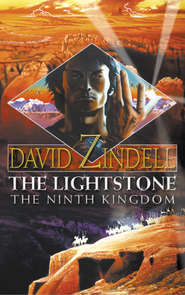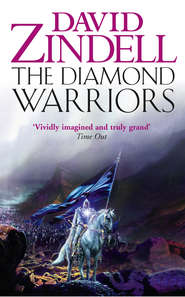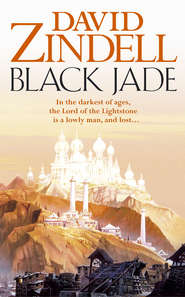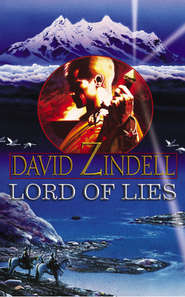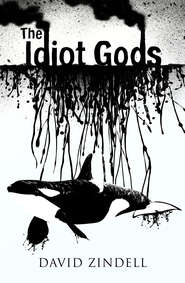По всем вопросам обращайтесь на: info@litportal.ru
(©) 2003-2024.
✖
Neverness
Настройки чтения
Размер шрифта
Высота строк
Поля
‘Misnamed. By certain of the older eschatologists who divide essences into male and female. She should be called the “Silicon Goddess.” The universe gives birth to life; the essence of the universe is female.’
‘And what of men?’
‘They are repositories for sperm. Have you studied the dead languages of Old Earth as I’ve asked you to do? No? Well, there was a Romance expression: instrumenta vocalia. Men are tools with voices. Magnificent tools they are. And sometimes their voices are sublime. But without women, they’re nothing.’
‘And women without men?’
‘The Lechoix Matriarchy was founded five thousand years ago. There are no patriarchies.’
I sometimes think my mother should have been an historian or a remembrancer. She always seemed to know too much of ancient peoples, languages and customs, or at least enough to turn arguments her way.
‘I’m a man, Mother. Why did you choose to have a son?’
‘You’re a foolish boy.’
I took a long sip of coffee, and I wondered aloud, ‘What would it be like for a man to talk with a goddess?’
‘More foolishness,’ she said. And then, ‘I’ve made our decision. We’ll go to Lechoix.’
‘No, Mother. I won’t be the only man among eight million women who prize cunning above faith.’
She banged her coffee cup down on the table. ‘Then go to your race. With Soli. And be thankful your mother’s mother taught me cunning.’
I stared as she stared at me. We stared at each other for a long time. As a master cetic might, I tried to read the truth from the flickers of light reflecting from her bright irises and from the set of her wide mouth. But the only truth that came to me was an old truth: I could no more read her face than I could descry the future.
I sucked the last drops of coffee from my cup and touched my mother’s forehead. And then I went out to race Soli.
The race of the Thousand Pilots is not supposed to be a serious affair. (Neither do as many as a thousand pilots ever take part in the festivities.) It is, essentially, a somewhat farcical pitting of old pilots against the new, a symbolic rite of passage. The master pilots – usually there are about a hundred or so – gather in front of the Hall of the Ancient Pilots, and, as is their wont, they drink mugs of steaming kvass or other such beverages, all the while slapping shoulders and hands to give each other encouragement while they shout and jeer at the smaller group of new pilots. That afternoon there were mobs of brightly furred academicians, high professionals and novices crowding the ice of Resa Commons. There were wind chimes tinkling and journeymen whistling to the wormrunners as they held up their gloved hands to place their illegal bets. From the steps of the Hall came the piping of the clarinas and shakuhachis. The high, keening notes seemed to me like an anguished plea full of desperation and foreboding, at odds with the gaiety all around us. Bardo, too, must have felt the music inappropriate because he came up to me as I tested the edges of my skates with my thumbnail, and he said, ‘I detest mystical music. It makes me feel pity for the universe and arouses certain other feelings I’d rather not have aroused. Give me horns and drums, and by the way, Little Fellow, could I offer you a pinch of fireweed to get the blood singing?’
I refused his red crystals, as he must have known I would. The race master – I saw to my surprise that it was Burgos Harsha, wobbling on his skates because he had no doubt been drinking kvass since the morning’s preparations – called the two groups to our starting places. We crowded along the red chequered line where the lesser glidderies gave out onto the white ice at the edge of the Commons. ‘I had something important to tell you, but I’ve forgotten what it was,’ he cried out. ‘And when have you ever known me to forget anything? Now what was I saying? Does it matter? Well, then, may you pilots not lose your way and may you return soon.’ He reached for the white starting flag that a novice held out to him and managed to entangle his forearm in the cotton fabric. The novice pressed the short, wooden staff into his grasping fingers, and he waved the flag back and forth in front of his face, and the race began.
I shall mention only a few details of what happened on the streets of my city that day, because due to the peculiar nature and rules of the race, that is all a single pilot can do. The rules are simple: A pilot may choose any path through the four quarters of the city so long as she or he passes in sequence through one of the various checkpoints such as Rollo’s Ring in the Farsider’s Quarter, or the Hofgarten between the Zoo and the Pilot’s Quarter. The theory is that the smartest and most cunning pilot will win, the pilot who has best memorized the streets and shortcuts of our city. In practice, though, speed is at least as important as brains.
Bardo bellowed and stroked as he pushed between a cluster of master pilots who were blocking his way. (Such shoving, I should add, is permitted if the pilot first shouts out a warning.) Blond-haired Tomoth, who stroked furiously in a high tuck, almost fell as Bardo’s elbow caught him on the shoulder. Then Bardo shouted out, ‘First among equals!’ and he disappeared around the curve of the gliddery.
We caught up to him at the Rose Womb Cloisters, that jumble of squat buildings at Resa’s western edge housing the tanks in which we had floated for a considerable portion of our journeyman years. He was skating raggedly as we passed him. He had pulled the hood of his kamelaika away from his dripping head. ‘First among … equals,’ he said, wheezing and gasping for air. ‘At least … for a … quarter mile.’
At the west gate of the Academy we dispersed. Fifteen pilots turned onto the southernmost of the orange glidderies that lead to the Way while eight master pilots and six pilots – Soli and myself among them – chose a lesser gliddery through the gleaming Old City in order to avoid the arterial’s heavier traffic. And so it went. The sky above us was deep blue, the air dense and cold. In front of me Soli’s steel skates striking smoothly against the ice and the shouts and laughter of the onlookers lining the narrow street were like a racy music. I tucked low and turned as I cradled my right arm against the small of my back, and suddenly I was alone.
I saw other pilots only a few times during the rest of the race. I did not want to make a false analogy between the streets of Neverness and the pathways through the manifold, yet I could not help thinking about the similarities: to suddenly pass from the cold, shadowed, red lesser glidderies onto a sliddery and then to the brilliantly illuminated Way was like fenestering, falling from the manifold into the bright light surrounding a star. As a pilot far from our city segues into a decision tree where he must choose the correct pathway or perish, so we racers had to match our memories of the branching streets against the reality of the tangled knots of glissades and glidderies, or lose. And if dreamtime can be said to be the most important and pleasurable of a pilot’s mindsets, then the ecstasy of cool wind and intensely focused vision was what we felt, at least for the first five miles or so. Thus when I entered the checkpoint of the Winter Ring deep within the Farsider’s Quarter, and I saw Soli and Lionel ten yards in front of me and other racers skating onto the opening of ice behind me, I had enough breath and enthusiasm to call out, ‘Five miles alone on the city streets, and here we gather, as if we were stived around the fixed-points of a star!’
As Soli turned to answer me, the features of his face narrowed into a mask of fierce concentration. He was breathing deeply, and he said, ‘Beware exploding stars!’ And then he was gone, speeding down one of the lesser glidderies connecting to the dangerous Street of Smugglers.
I did not catch up to him until near the end of the race. I circled the spouting Silver Spume in the Zoo, where Friends of Man and Fravashi and two races of aliens I had never seen before looked on at the curious spectacle that we provided them. At North Ring the race officer shouted, ‘Soli first followed by Killirand a hundred yards followed by Ringess one hundred and fifty yards followed … ,’ and at the great circle outside the Hofgarten, where the Run intersects the Way, I heard, ‘Soli first followed by Ringess fifty yards followed by Killirand three hundred … ,’ and so it went. At the last checkpoint, which was in the Pilot’s Quarter, I saw my uncle a mere twenty yards ahead. I knew I would not see him again until I crossed first into the Commons and Burgos Harsha pronounced me the winner.
I was wrong.
I was skating west on the Run, cleverly – or so I thought – doubling back along the northern edge of the Old City so that I could cut along a little gliddery I knew of that led straight to the Academy’s north gate. The blue ice was crowded with novices and others who had somehow guessed that a few of the racers might choose this unlikely route. As I was congratulating myself and envisioning Burgos pinning the diamond victory medal to my chest, I glimpsed a streak of black through the press of skaters in front of me. The crowd shifted, and there was Soli calmly stroking close to the red stripe separating the skating lane from the sled lane. I was considering shouting out a challenge when I heard raucous laughter behind my back. I turned my head midstroke and saw two black-bearded men – wormrunners I guessed from the flamboyant cut of their furs – elbowing each other, clasping hands, and alternately whipping each other ahead by snapping their arms. They were much too old, of course, and the street was much too crowded for a game of bump-and-stake. I should have perceived this immediately. Instead, I completed my stroke because I was determined to give Soli no warning as I passed him. All at once the larger wormrunner smacked into Soli’s back, propelling him across the warning stripe into the sled lane. There came the sudden thunder of a large red sled as he stutter-stepped on his skates with his arms outstretched. He performed a desperate dance to avoid the sled’s hard, pointed nose, and suddenly he was down. The sled rocketed over him in a tenth of a second. (Though it seemed like a year.) I crossed the warning stripe and pulled him to the skating lane. He pushed me away with an astonishing force for someone who so nearly had been impaled. ‘Assassin,’ he said to me. He grunted and tried to stand.
I told him that it was a wormrunner who had pushed him, but he said, ‘If not you, then your mother’s hirelings. She hates me because she thinks you’ll be held to your oath. And for other reasons.’
I looked at the circle of people standing over us. Nowhere could I see the two black-bearded wormrunners.
‘But she’s wrong, Moira is.’
He held his side and coughed. Blood trickled from his long nose and open mouth. He beckoned to a nearby novice who approached nervously. ‘Your name?’ he asked.
‘Sophie Dean, from The Nave, Lord Pilot,’ the pretty girl answered.
‘Then,’ he said, ‘your Lord Pilot in the presence of the witness Sophie Dean releases Mallory Ringess from his oath to penetrate the Solid State Entity.’
He coughed again, spraying tiny red droplets over Sophie’s white jacket.
‘I think your ribs must be broken,’ I said. ‘The race is over for you, Lord Pilot.’
He grabbed my arm and pulled me closer to him. ‘Is it?’ he asked. Then he coughed as he pushed me away and began skating towards the Academy.
I stood there for a moment staring at the drops of blood burning tiny holes into the blue ice. I did not want to believe that my mother had sent assassins to murder Soli. I could not understand why he had released me from my oath.
‘Are you all right, Pilot?’ Sophie asked.
I was not all right. Though my life was saved, I felt sick to my stomach, utterly wretched. I coughed suddenly and vomited up a chyme of black bread and black coffee and bile.
‘Pilot?’
Sophie blinked her clear blue eyes against the sudden wind cutting beneath my garments, and in my mind was a knowledge, a complete and utter certainty that I would keep my oath to Soli and my vows to the Order no matter the cost. Each of us, I realized, must ultimately face death and ruin. It was merely my fate to have to face them sooner than most.
‘Pilot, shall I call for a sled?’
‘No, I’ll finish the race,’ I said.
‘You’re letting him get a lead.’
It was true. I looked down the Run as Soli turned onto the yellow street leading to my secret shortcut to the west gate.
‘Don’t worry, child,’ I said as I pushed off. ‘He’s injured and full of pain, and he’s coughing blood. I’ll catch him before we get halfway to Borja.’
I was again wrong. Though I struck the ice with my skates as fast as I could, I did not catch him as we passed the spires of Borja, and I did not catch him as we circled the Timekeeper’s Tower; I did not catch him at all.
The wind against my ears was like a winter storm as we entered Resa Commons. The multitudes cheered, and Burgos Harsha waved the green victory flag, and Leopold Soli, barely conscious and leaking so much blood from his torn lungs that a cutter later had to pump plasma into his veins, beat me by ten feet.
It might as well have been ten light-years.
3 (#ulink_2032afa3-1194-51c0-ab47-595a421f70c5)
The Timekeeper’s Tower (#ulink_2032afa3-1194-51c0-ab47-595a421f70c5)
The goal of my theory is to establish once and for all the certitude of mathematical methods … The present state of affairs where we run up against the paradoxes is intolerable. Just think, the definitions and deductive methods which everyone learns, teaches and uses in mathematics, lead to absurdities! If mathematical thinking is defective, where are we to find truth and certitude?







